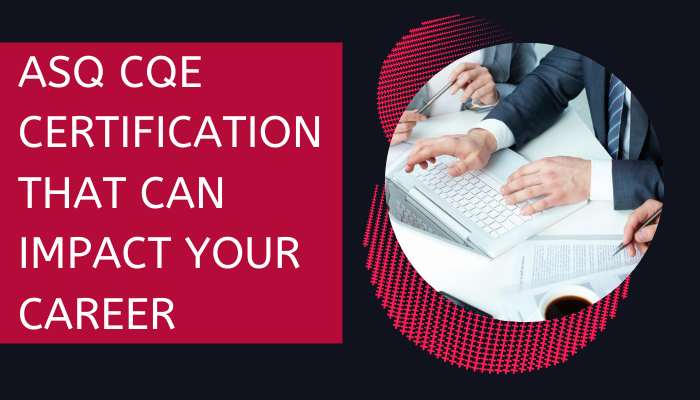ASQ Certified Quality Engineer Certification
The Quality Engineer is an individual who comprehends how to control product and service quality. This contains the development and operation of quality control systems. Designing and implementing testing and inspection procedures and using metrology and statistical methods to investigate and correct improper quality. An understanding of motivation and human factors. How to put in place cost of quality techniques. Installing quality information systems and auditing them for defects.
To become a Certified Quality Engineer CQE, the applicant must meet several requirements. The applicant must have eight years of on-the-job experience and at least three years in a decision-making position. If you graduated with a college diploma, bachelor's, or Master’s Degree, 2, 4, or 5 years might be a waiver.
A Certified Quality Engineer (CQE) is a professional in the quality assurance field who holds a certification issued by the ASQ. An individual with this credential confirms their expertise, knowledge, and experience in quality engineering by skillfully managing the implementation of quality engineering processes. A statistics background can help round out the CQE’s ability to troubleshoot and identify complex mechanical and tech systems problems.
The Certified Quality Engineer is a professional who understands the principles of product and service quality evaluation and control. The CQE comprehends the components of a quality control system and the application and analysis of testing and inspection procedure. They can use metrology and statistical methods to diagnose and enhance product quality control processes, comprehend and can operate quality cost concepts and techniques, and have the knowledge and ability to audit quality systems for deficiencies.
Although this is intended for those planning to sit for the Certified Quality Engineer exam, the topics are covered in sufficient detail. People with little advanced knowledge of the concepts will be capable of mastering them with a fair amount of practice.
The Value of a CQE Certification
At least in many developing economies, the CQE certification is not as well-known as most Six Sigma certifications. However, intelligent hiring managers should see it for what it is and realize it is a valuable certification.
So what is the value of a CQE certification? It changes based on why you have a certificate and what you do with the certification's knowledge.
The Quality Engineer is an individual who understands how to control product and service quality. This contains the development and operation of quality control systems. Designing and implementing testing and inspection procedures and using metrology and statistical methods to investigate and correct improper quality. An understanding of motivation and human factors. How to put in place cost of quality techniques. Installing quality information systems and auditing them for defects.
Suppose you earn ASQ certificates solely for the ability to list certifications. If you pass the test and then forget all the material, then the certification has little significance other than the temporary enhancement of your ego.
That is different if you earn a CQE certification as a by-product of mastering a body of knowledge or courses. It has value. Suppose you learn and use the concepts and techniques at work. If you do something different and better due to what you learned, that has value.
Using what you learn, not getting a piece of paper, provides value to your employers/clients as you can efficiently and effectively solve problems, find solutions, and enhance products/processes. It provides value to you as you demonstrate your mastery; you are often given more challenges, responsibility, recognition, and pay.
The CQE certification is not the end in itself, and it is a marker of your potential and capability. Certifications are a shorthand way of indicating what you know and can deliver. The CQE body of knowledge covers a broad scope of disciplines, including development and operation of quality management systems, classification, verification, and validation of products, processes, and services, Lean and Six Sigma, application and analysis of testing and inspection procedures, use of metrology and statistical methods to diagnose and correct improper quality control practices, human factors and motivation, reliability and maintainability, measurement system analysis (MSA), product and process control, risk management, etc.
To Summing-up
Construct confidence as you prepare for the ASQ CQE exam with hundreds of practice questions from ASQ. Simulate a timed exam from your home or office convenience, review specific topic areas, and determine your strengths and weaknesses to determine where to focus your studies.







